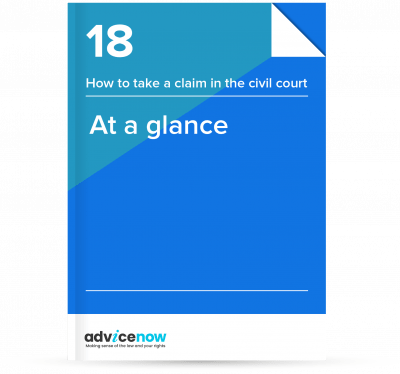| Breach of contract, or Debt | Loss or damage which is someone else’s fault (negligence) with no personal injury | Personal injury (including road traffic accidents) |
Time limits (This is the basic time limit. For exceptions and special cases see our guide to time limits for small claims and fast-track claims) | 6 years | 6 years | 3 years |
Is it a small claim? | Yes, if the value is under £10,000. | Yes, if value under £10,000. | Yes, if - the injuries were not caused by a road accident, or
- were caused by a road accident that occurred before 31st May 2021, and the total value is under £10,000, and the value of the personal injury element is under £1,000, or
- if the injuries were caused by a road accident that occurred after 31st May 2021, and the total value of the claim is under £10,000, and the value of personal injury element is under £5,000. (See How to make a claim about injuries caused by a car accident for other limitations).
|
Is it a fast track claim? | Yes, if the value is over £10,000 and under £25,000 | Yes, if the value is over £10,000 and under £25,000 | Yes, if - the injuries were not caused by a road traffic accident, and the total value is between £10,000 and £25,000, and the personal injury element is valued at over £1,500.
- the injuries were caused by a road traffic accident and the total value is between £10,000-£25,000, or
- the injuries were caused by a road traffic accident and the total value is under £10,000 but they are not a small claim (for example, because the personal injury element is valued at over £5000 if the accident occurred after 31st May 2021, or £1000 if the accident occurred after May 2021).
|
Is there a pre-action protocol? | Yes,if your case is about debt or money owed. Otherwise No. You need to follow the guidelines for pre-action conduct. See section 4 of our guide to pre-action conduct and pre-action protocol | No. You need to follow the guidelines for pre-action conduct. See section 4 of our guide to pre-action conduct and pre-action protocol | Yes. Unless it is a small claim, when you need to follow the guidelines for pre-action conduct. See Things you need to know about court procedure before you start a civil case for more detail. If your claim is for personal injury caused by a car accident that occured on or after May 31st 2021, and the total value is under £10,000, and value of personal injury element is under £5,000 you need to use the new pre-action protocol. You do this by using the Official Injury Claim service. Please see How to make a claim about injuries caused by a car accident.
|
Can I use Money Claim? (see How to start a claim for other limitations, e.g. if there is more than one defendent, it is against a Govt. body, or either party are under 18 etc) | Yes, if the value is under £10,000. See our guide to how to start a small claim. | Yes, if the value is under £10,000. See our guide to how to start a small claims case. | No.You will have to complete the paper form. See how to start a civil case |
Can I use Money Claims Online (MCOL)? (See How to start a civil claim e.g. if there are more than two defendants, or they don’t have an address in England and Wales) | Yes, for debt or a fixed amount of money up to £100,000. See our guide how to start a civil case. | Only if you are claiming a fixed amount of money up to £100,000. See our guide how to start a civil case. | No. You will have to complete the paper form. See how to start a civil case. |
Will I have to pay the other side’s legal costs if I lose my small claim? | No, except for court fees, witness expenses, and any expert’s report, unless you have behaved unreasonably | No, except for court fees, witness expenses, and any expert’s report, unless you have behaved unreasonably | No, unless you have behaved unreasonably |
Will I have to pay the other side’s legal costs if I lose my fast track claim? | Yes. See our guide to legal costs for more information. | Yes. See our guide to legal costs for more information. | Not if your case started before 1st October 2023, unless you have failed to beat a Part 36 offer, or your claim was fundamentally dishonest. Yes if your case started after 1st October 2023. See Legal costs and who pays them for more information. |
What award can the court make if I win? | Debt: ● Amount of debt ● Interest on that amount Breach of contract: ● Usually, money to put you in the financial position you would have been if the contract had been carried out properly ● Occasionally, ordering the other person to remedy the breach of contract ● Interest on that amount | ● Compensation to put you in the position you would have been in if the person had carried out their duty ● Interest on that amount | ● Compensation for the injury itself, that is for your pain, suffering and loss of amenity ● Compensation for your losses and expenses ● Interest on that amount |

